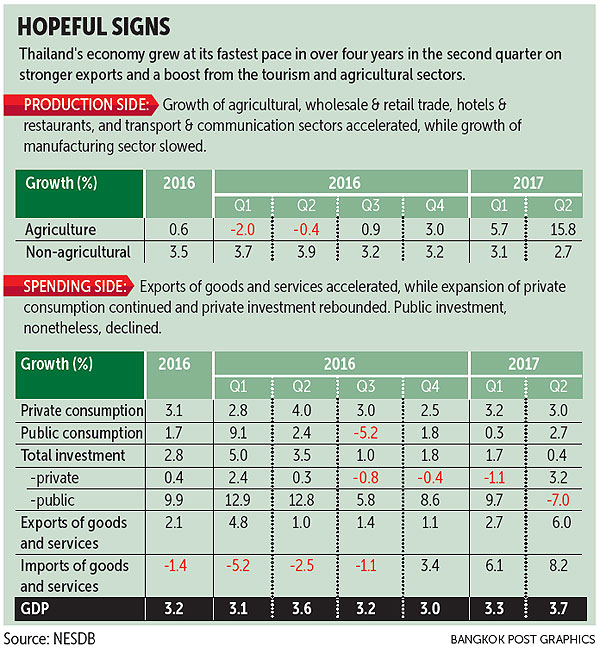Thailand: GDP up 3.7%, best since 2013
The economy grew at its fastest pace in more than four years in the second quarter, prompting the government’s planning unit to raise its 2017 economic growth forecast range to 3.5-4% from 3.3-3.8% projected in May.

The National Economic and Social Development Board (NESDB) reported yesterday that Thai GDP rose by 3.7% year-on-year in the April-June period after expanding 3.3% in the first quarter.
The rise marked a 17-quarter high since 5.2% growth in the first quarter of 2013.
GDP rose a seasonally adjusted 1.3% in the second quarter compared with the previous three months.
In the first half, the economy grew by 3.5% year-on-year.
NESDB secretary-general Porametee Vimolsiri said second-quarter growth was driven by an acceleration in exports of goods and services, continued expansion of private consumption and a rebound in private investment.
The growth of agricultural, wholesale and retail trade, hotels and restaurants, and transportation and communication accelerated.
According to Mr Porametee, expansion in private investment was a significant contributor to economic growth in the second quarter.
Private investment expanded by 3.2% year-on-year for the quarter mainly driven by investment in machinery and equipment, and construction, after contracting 1.1% in the first quarter.
Exports in US dollar terms also accelerated, owing to economic improvements among key trading partners (the US, the EU, China and Japan) and rising commodity prices in the world market.
Export value in the second quarter of 2017 was recorded at US$56.1 billion, representing 8% growth — the fastest clip in 18 quarters.
The hotels and restaurants sector grew steadily in the second quarter, supported by tourism receipts. The sector grew by 7.5% in the quarter, accelerating from 5.3% in the previous quarter.
Tourism receipts totalled 625.0 billion baht, up 9.4%. Foreign tourism receipts were at 395.0 billion baht, an increase of 8.8%, compared with 3.9% in the previous quarter. The increase was fuelled by American, South Korean, Malaysian, Lao and Chinese tourists. Thai tourism receipts were at 230.0 billion baht, up 10.3%, accelerating from 4.6% in the previous quarter.
Nonetheless, according to the NESDB, government investment in the second quarter declined sharply by 7.0% against a 9.7% increase in the first quarter. The fall was partly due to accelerated disbursement in the previous quarter.
“It is expected that the Thai economy will grow by 3.5-4.0% this year, supported mainly by a recovery in exports in tandem with a pickup of the world economy and global trade volume, stronger expansion of both public and private investment in the latter half of the year, the acceleration of key production sectors including hotels and restaurants, manufacturing and construction, and favourable expansion of household income, particularly in agricultural, export, tourism and related service sectors, which will continue to support private consumption,” Mr Porametee said.
“The export value of goods is expected to expand by 5.7%, from 3.6% in an earlier forecast, with private consumption and private investment to grow 3.2% and 2.2% this year from 3% and 2% projected earlier.
The agency is maintaining its government spending forecast of 3.2% growth but cutting its forecast for public investment growth to 8% from 12.6% earlier.
Deputy Prime Minister Somkid Jatusripitak said economic growth in the second quarter showed continued improvement in the Thai economy from last year and the first quarter of this year.
He said the government will try its best to maintain the growth momentum.
“This performance in the second quarter is quite good and the government will try to maintain this momentum until the latter half this year,” Mr Somkid said. “The government is hopeful that the Thai economy in the second half will fare better than in the first, thanks to the growing trend of exports and recoveries in private investment and the agricultural sector. “
But he acknowledged the significant delays in government investment and pledged to stimulate public investment in the second half.
According to Mr Somkid, the government is closely monitoring export performance, saying Thai economic prospects will become brighter if exports maintain their growth momentum in July.
Kobsak Phutrakul, assistant minister to the Prime Minister’s Office, said almost all factors have improved, though he allowed that low-income earners’ consumption, which is heavily reliant on agricultural prices, remains relatively weak.
Don Nakornthab, senior director in the macroeconomic and monetary policy department at the Bank of Thailand, said second-quarter growth was higher than the central bank expected, mainly supported by growth in exports of goods and services.
“Private consumption and private investment also expanded more strongly than the central bank estimated earlier,” he said.
Mr Don said earlier economic growth in the second quarter was likely to be close to the first quarter’s reading of 3.3%.
He said the economic recovery is expected to continue, while risks that warrant close monitoring remain, such as uncertainties pertaining to US economic and foreign trade policies, geopolitical risks and the continuity of government investment in megaprojects.
Source: http://www.bangkokpost.com/business/news/1310783/gdp-up-3-7-best-since-2013


 English
English




